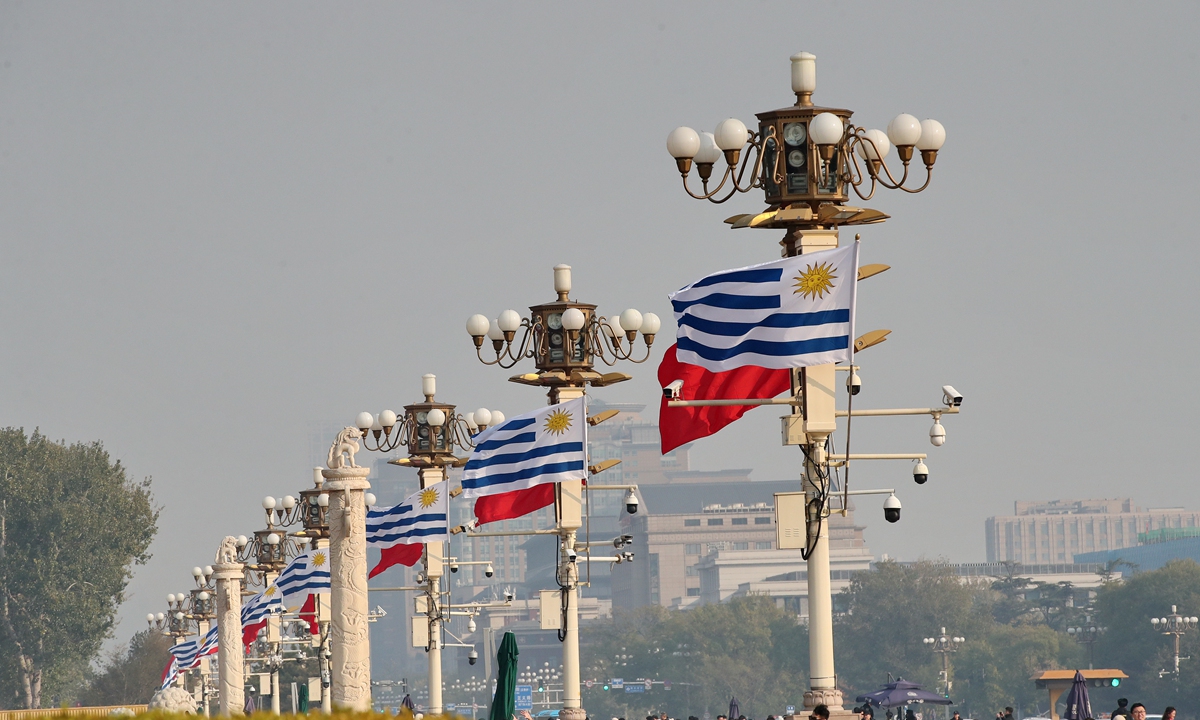China-Uruguay ties reach new level, to open up new paths for rising cooperation: official

A view of Montevideo, capital of Uruguay Photo: VCG
China-Uruguay relations have entered a new era, reaching a historic high level while unlocking new possibilities for deepened cooperation, Fernando Mattos Costa, Minister of Livestock, Agriculture and Fisheries of Uruguay, told the Global Times on Thursday, in an exclusive interview in Beijing.
In addition to promoting closer bilateral trade and investment, cooperation in other areas may also be explored and extended, including the possibility of local currency settlement in trade, said the minister.
The remarks were made during the visit of Uruguayan President Luis Alberto Lacalle Pou to China, from Monday to Friday, during which the two countries announced the elevation of bilateral relations to a comprehensive strategic partnership, while dozens of agreements were also inked involving a wide range of fields, from trade and investment to digital economy, green development and agriculture.
Speaking with the Global Times, Mattos Costa, who accompanied the Uruguayan president during the visit, said that it is a very exciting state visit that marks a new level in bilateral ties.
Mattos Costa said, "We are in a new era of bilateral relations. We share some of our foreign policies with China and are aligned to promote greater development and prosperity for our people."

Fernando Mattos Costa, Minister of Livestock, Agriculture and Fisheries of Uruguay Photo: Courtesy of Fernando Mattos Costa
Strengthened cooperation
Also, both sides uphold international values such as free trade and oppose trade and investment protectionism, he said.
Trade between Uruguay and China, its largest trading partner, has seen robust growth. According to official Uruguayan data, in 2022, exports to China accounted for about 30 percent of Uruguay's total exports. Last year, Uruguay's exports to China reached a historic high, with a significant proportion being agricultural and livestock products, according to Chinese media reports.
In the joint statement released on Thursday regarding the elevation of bilateral relations to a comprehensive strategic partnership between China and Uruguay, both sides emphasized the positive outcomes achieved in the field of agriculture.
In particular, they highlighted the progress made through the collaboration between the Chinese Academy of Agricultural Sciences and the National Agriculture Research Institute of Uruguay in establishing a joint laboratory for soybean research and innovation under the BRI framework.
The minister noted that Uruguay and China have considerable opportunities for cooperation in areas such as food security, new agricultural and livestock technology, and agricultural product processing.
Additionally, both countries have a shared commitment to supporting sustainable development. "We know that China is making a big effort on de-carbonization for sustainable development...and although we have a different size of economy, we have a complimentary way to forge good relations and increase cooperation," he said.
Currently, bilateral relations have reached the highest level that has ever been seen in history, and new possibilities for cooperation are to be explored, according to the minister.
Even though China and Uruguay are far apart geographically, "we have no large distance when we continue to build up our friendship and good relations," he noted.
Since the establishment of diplomatic relations 35 years ago, a close economic and trade relationship has been the cornerstone of China-Uruguayan ties. China is Uruguay's largest trading partner, not only for wool but also as the primary importer of Uruguayan beef and soybeans.
Confidence boost
The Uruguayan president's visit to China, along with key cabinet members and a large business delegation, undoubtedly serves as a confidence boost for future cooperation between the two countries, Tang Jie, a researcher with the Institute of American and Oceanian Studies at the Chinese Academy of International Trade and Economic Cooperation, told the Global Times on Friday.
Stronger trade and investment ties between the two nations have opened new possibilities for future cooperation in areas such as local currency settlements. In the interview with the Global Times, Mattos Costa said there is a possibility of this happening.
"Maybe the central banks have to work hard toward this goal... for [local currency settlement] meaning cheaper trade and larger market," he said.
With the current new level of bilateral relations, "maybe we can reach some agreement [regarding local currency settlement] in order to make our trade most cost-efficient," the minister said.
While China and Uruguay have yet to sign a currency swap agreement, currently, within the Southern Common Market, both Brazil and Argentina have already established bilateral local currency settlement mechanisms with China, paving the way for a stronger trade growth between the Latin American countries and the world's second largest economy.
Tang said that the Uruguayan government, taking into full consideration the risks and benefits involving payments, will work toward optimizing currency settlement arrangements with China.
"If, in the future, the two countries could reach a bilateral free trade agreement, settling transactions in local currencies will significantly reduce transaction costs and help mitigate trading risks," Tang added.

